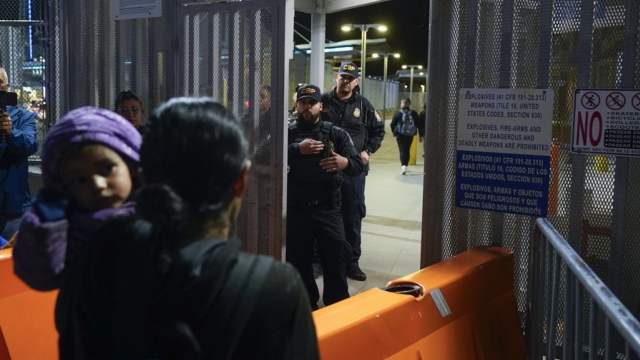Uncertain about the future, migrants made a final push to cross into the U.S. before Title 42 came to an end at midnight Thursday.
Neiker Miguel Lugo-Vallenilla says he embarked on a treacherous journey from Venezuela and turned himself in at the border.
“We don’t know what’s in the new decree, that was the fear that drove us to cross before the 11th of this month,” said Lugo-Vallenilla.
Twelve days later, he was released in El Paso with a notice to appear in court in four months.
SEE MORE: Mayorkas warns migrants: 'The border is not open' after Title 42 ends
Over the last few days, Department of Homeland Security officials say agents encountered an average of 10,000 migrants a day along the southwest border; that's nearly the 13,000 crossings officials had projected with the end of Title 42.
Title 42 was a pandemic-era policy used by the U.S. to expel migrants quickly and swiftly.
The U.S. is now offering more legal pathways to seek asylum while also cracking down on illegal crossings.
New immigration policies published include turning away anyone seeking asylum who did not seek protection in a country they crossed on their journey to the U.S. or who failed to apply online.
"We believe that the measures that we have taken, including the rule that was published today, which puts some asylum conditions on people who don't use lawful pathways, will over time, reduce the numbers we're seeing at the border," Border and Immigration Assistant Secretary Blas Nuñez-Neto said.
But critics say it may not be enough.
SEE MORE: Many migrants looking to seek asylum after Title 42 ends
"The only thing that's going to shut this crisis down is to detain people until they've had their day in court or keep them outside the country until they have their day in court. You have to end catch and release," said Rodney Scott, former U.S. Border Patrol chief.
While thousands of migrants attempt to navigate the sweeping immigration changes, cities like El Paso say this time they're prepared to provide shelter, meals, and transportation for migrants released by the Border Patrol.
"I could tell you from what happened last year, that's not going to be enough," El Paso District 5 Councilwoman Isabel Salcido said. "We need to really look at how do you fund local municipalities, because it's not sustainable."
As cities seek solutions, released migrants prepare for immigration court in a system backlogged with more than two million cases pending.
Scripps News looked at some of the court documents provided to migrants and found that the waiting periods for their court dates varied randomly, ranging from three months to as long as three years.
Furthermore, the ACLU responded overnight to the lifting of Title 42, saying, "We are suing to stop Biden’s new asylum ban, which closes off access to safety for the majority of people seeking asylum in the United States."
Trending stories at Scrippsnews.com




